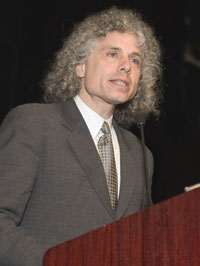|

 "The problem with the religious solution [for mysteries such as
consciousness and moral judgments] was stated by Mencken when he
wrote, 'Theology is the effort to explain the unknowable in terms
of the not worth knowing.' For anyone with a persistent intellectual
curiosity, religious explanations are not worth knowing because they
pile equally baffling enigmas on top of the original ones. What gave
God a mind, free will, knowledge, certainty about right and wrong? How
does he infuse them into a universe that seems to run just fine
according to physical laws? How does he get ghostly souls to interact
with hard matter? And most perplexing of all, if the world unfolds
according to a wise and merciful plan, why does it contain so much
suffering? As the Yiddish expression says, If God lived on earth,
people would break his window."
"The problem with the religious solution [for mysteries such as
consciousness and moral judgments] was stated by Mencken when he
wrote, 'Theology is the effort to explain the unknowable in terms
of the not worth knowing.' For anyone with a persistent intellectual
curiosity, religious explanations are not worth knowing because they
pile equally baffling enigmas on top of the original ones. What gave
God a mind, free will, knowledge, certainty about right and wrong? How
does he infuse them into a universe that seems to run just fine
according to physical laws? How does he get ghostly souls to interact
with hard matter? And most perplexing of all, if the world unfolds
according to a wise and merciful plan, why does it contain so much
suffering? As the Yiddish expression says, If God lived on earth,
people would break his window."
Из книги Пинкера The Meaning of Life.
PARTICIPANT: [...] someone has your picture on a
"Deist" web site with
your endorsement of that movement. Is it true? Are you Deist or Atheist?
PINKER: I vaguely remember saying something
encouraging to someone who called himself a deist -- the referent
of "deism" (i.e., something that isn't "theism") that it would be hard
to object to explicitly. But I certainly don't believe there is some
mysterious godlike presence everywhere, if that is what "deism" is
taken to be.
September 02, 2003 booktalk.org, chat transcript.
Q: You are an atheist, although less strident about
it than your fellow evolutionary scientist Richard Dawkins. Do you
ever worry that by pitting Darwin vs. God, mano a mano, evolutionists
are encouraging Creationism, since an awful lot of Americans would pick
God if forced to choose?
A: My criticism of religion in "The Blank Slate"
was defensive, meant to counter the argument that morality can only
come from a belief in a soul that accepts God's purpose and is rewarded
or punished in an afterlife. I think the evidence suggests that this
doctrine is false both logically and factually. I don't make a point
of criticizing religion in general. Some hard-headed biologists and
evolutionary theorists believe that an abstract conception of a divine
power is consistent with conventional Darwinism.
From an October 30, 2002 interview
with Steve Sailer for UPI:
"I never outgrew my conversion to atheism at 13,
but at various times was a serious cultural Jew."
1999 Guardian interview.
|